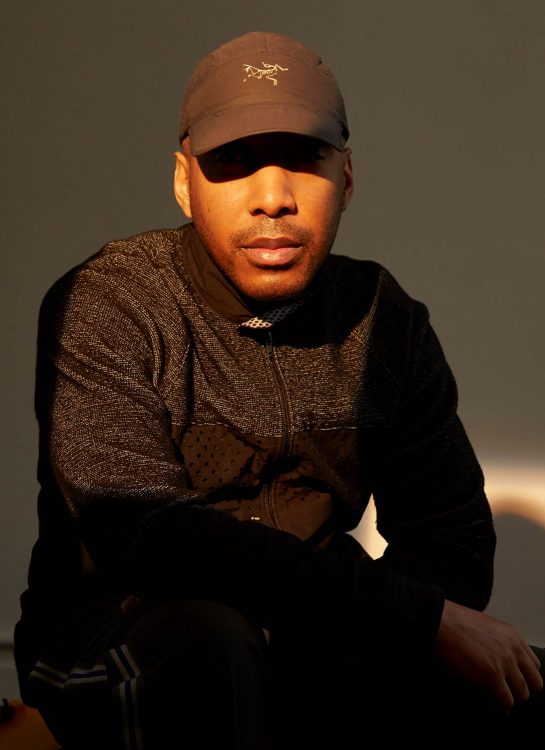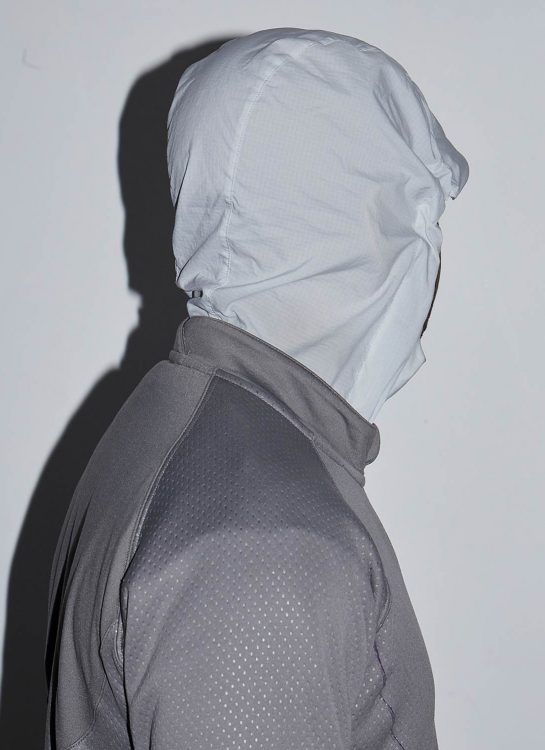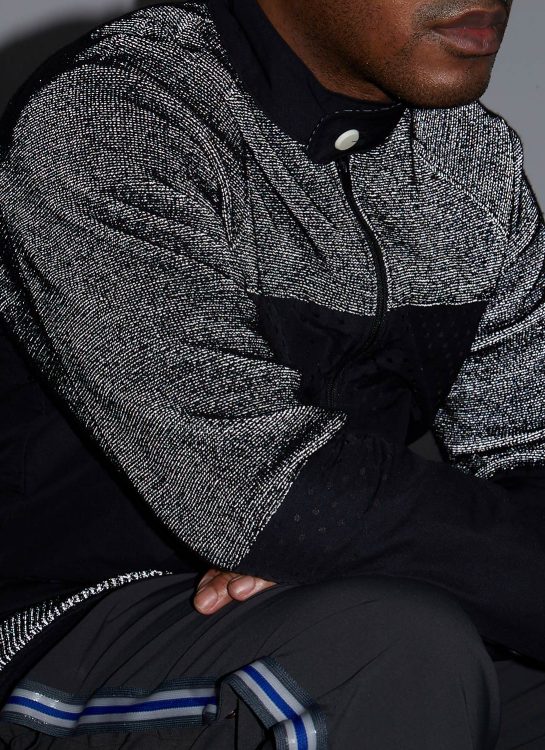- Words Denzil Bell
- Photography Peter Butterworth
- Fashion Stormy Haughton and Rob Boyd
- Grooming Chloe Palmer
- Photography Assistant Oliver Truelove
Just in time for festival season, Shy FX dropped his collaborative tape with Mr. Williamz, Rudeboy Design, today. To celebrate, we revisit his interview from 2019.
Drum & bass Godfather, Shy FX, is the maverick Brit DJ and producer creating revolutionary, genre blending ragga-jungle classics. Taken from Notion 83.
Staying true to his name, Shy FX isn’t a big fan of interviews, generally esquing press in favour of spending his time in the studio making incredible tunes. Shy’s career kick-started in 1994 in the bedroom of a terraced house in Edmonton, London, when a seventeen-year-old Shy cooked up the seminal club anthem “Original Nuttah”. The track was a complete game changer, throwing down references from Star Wars to Predator, fusing ragga and jungle and even breaking its way into the official UK charts (not to mention the hearts of every Moschino-clad clubber in the land).
Born Andre Williams, the grandson of famed London soundsystem chief Count Shelley, Shy’s first studio engineering job was at Ariwa studio working with Dub legend Mad Professor before taking an apprenticeship at SOUR. He’d eventually be sacked for refusing to the clean the toilets before the label heard a cut of “Original Gangsta” and swiftly added Shy to their rosta as an artist in his own right.
Over the next decade Shy FX dominated the drum & bass scene, releasing underground smashes like “Bambaata”. The early 00s brought further mainstream attention with the release of his hit single “Shake Your Body”, reaching number 7 in the UK singles chart and leading to collaborations with Dizzee Rascal, Wiley, Kano and Roses Gabor. During this time, Shy co-founded the label Digital Soundboy alongside frequent collaborator T Power; the label fast became a pioneering hotbed for cross-genre releases from the likes of Breakage, Calibre and Redlight.
Latest project—Raggamuffin Soundtape (out via cult.ure)—features a dream team of notable talent including Maverick Sabre, Chronixx, D Double E, Kojey Radical, Ghetts, Cara Delevingne, Sinead Harnett and Lily Allen. The tape blends jungle, reggae, soul, hip-hop and R&B under one roof—once again proving that Shy FX is still the boss when it comes to merging genres.

- Jacket Stone Island X Shadow Project Archive
- Cap Shy FX's Own

- Jacket Nike x Undercover Gyakusou Archive
- Jacket Arcteryx Archive
What should the people know about your new project, the Raggamuffin Soundtape?
Initially I wanted to do an album, but then I thought nah that’s long. An album feels too serious—not to say that this project isn’t—but I like the idea of a mixtape. Sometimes you hear someone’s mixtape and you think to yourself that it’s much better than the album. A lot of the time there is much more excitement with the mixtape. But with my project and style, I couldn’t really see how I could make a mixtape, so my version of it is a ‘soundtape’. It’s got the excitement of a mixtape but it’s also a serious body of work, like an album.
How did “Roll The Dice” featuring Stamina MC & Lily Allen come together?
I originally did the tune with Stamina first and I played it as a dub, just testing it out. But then I thought that it needed another point of view and that it would be sick to have a female’s perspective as well. Lily was one of the first artists to pop up in my mind as someone who would complement the song nicely and she smashed it. With this project, it wasn’t about the name, it was all about who fit better on which track.
What’s your take on the current dnb scene?
It’s healthy at the moment. Everyone’s doing their thing. There was a time when it got incestuous… Let me elaborate on that: when us lot started, jungle didn’t exist. Also, back then, everything was much more segregated. So at a lot of these raves it was the first time, in my lifetime, that you had black, white, Asian all having a good time under one roof. We all had different backgrounds, so when it came to making the music, we were putting different things into the pot—whether it be hip-hop, rare groove, R&B or rock. Whereas the generation after us grew up on drum & bass, so when they were making it, all they were putting in was drum & bass. They weren’t really moving outside that sound. For me, a lot of it’s missing the soul and skank that I like.
I miss that 90s jungle sound and I love that you’re bringing it back with tracks like “Call Me”—I really get a lovers rock vibe from it!
Definitely, that’s my era. It’s all about putting that energy into the music, along with some soul and ragga.
The ragga style has been very apparent in your music from the start—would you say that comes from your early upbringing in your family home?
“Yeah, I grew up in a reggae household but my mum also used to play a lot of pop music and the classic Motown records. The common thread in my music is bass, reggae influence and a bit of soul. It’s also got a bit of a rudeboy feel, depending on my mood [laughs].
Making your own in the early Jungle days must have been exciting?
It was, because no one really knew what it was going to be. There were no rules back then—we were creating our own rules as we were going along, experimenting with different sounds. Back then it was very much a punk ethos, with a DIY vibe—our aim was to make music that no one had really heard before.
Your breakout jungle release was the now legendary “Original Nuttah”, did you know what you had on your hands when you created it?
Nah because I did a tune before called “Gangsta”, UK Apache heard it and his management got in contact with my people and then he came through to the studio to jump on the “Gangsta” riddim [which would become “Original Nuttah”]. For me it weren’t a big thing at the time, he did it in two takes and then went his way. For Apache it was a 15 minute job. I definitely felt that is was a banger, but nah, I didn’t know the track was going to be so big.

- Jacket Stone Island X Shadow Project Archive
- Cap Shy FX's Own

- Jacket Stone Island X Shadow Project Archive
The song always goes off at Carnival—what would you say is your personal favourite carnival memory over the years?
The first Carnival I went to was the one where “Original Nuttah” was being played. That was sick, because I was very young at the time, but I was also with a lot of people who had their issues with other people at Carnival. So it was exciting, but at the same time you had to be on your P’s and Q’s.
Another party starter of yours is “Shake Your Body”, created with your frequent collaborator T-Power. How did it feel to achieve significant chart success with the track?
It was wicked. My music career had been a rollercoaster up until that point and just before that I had released “Bambaata”, which was a big underground jungle track. But prior to that, I’ve always been a person that likes to mess around with different genres and in doing so, I think I lost a couple people—like I played a garage tune in the middle of a jungle rave and even though I smashed it, a lot of DJs at the time weren’t feeling it. But by that point, I’d grown in confidence, knowing that I do my ting. By the time “Shake Your Body” came around, the response was wicked, but my mind was always on what was next for me. It’s only recently that I’ve started to take a step back and enjoy the moment.
Your legendary record label with T-Power, Digital Soundboy, came about a couple of years after—why did you feel the need to start your own label?
That was around the time when the scene was getting too stagnant for me. When I made Digital Soundboy, it was all about bringing it back to the original ethos of Jungle, which is that it’s a melting pot of different styles, but that can go across all tempos. So it wasn’t just jungle—we were putting out reggae, dubstep, early Redlight stuff and grime, but it all had the Digital Soundboy thread. One of my favourite releases from the label was Breakage and Newham General’s “Hard” because there was nothing like it out at that time.
One of my favourite releases from the label is “Soon Come” featuring Liam Bailey, what ever happened to the reggae album Cornerstone that track was supposed to be on?
First of all, recording good quality reggae in its pure form takes a very long time. Also, when you do an album, you then have to tour it and I didn’t want to tour a project with only reggae music. So the music I made from that time is either already out or coming out as singles or on future EPs.
What’s the most legendary club night you’ve ever been to?
Too many to mention—different clubs at different times. The most important one to me is Roller Express in Edmonton, it was a club I’d go to when I was young: I was too young to get in, but we used to hang outside listening to jungle music coming from inside and seeing the strobe lights through the windows. For me, that was everything.
When you’re DJing is there a lot of pre planning or do you work more spontaneously?
Definitely spontaneously, I adjust to the crowd that’s in front of me.
Do you still enjoying DJing as much as you did when you first started?
I still enjoy it as much as I did when I started, one-hundred percent. There’s nothing that beats the feeling of making a tune that no one has heard before and playing it in front of people, seeing their reaction. What I miss is dubplate culture, which is when you would go to a club and hear a DJ play, and you’d hear tunes you’d never heard before. People now are putting tunes online before they’ve even finished the tracks, but I miss that you used to feel like you’re getting educated while you’re at the club.

